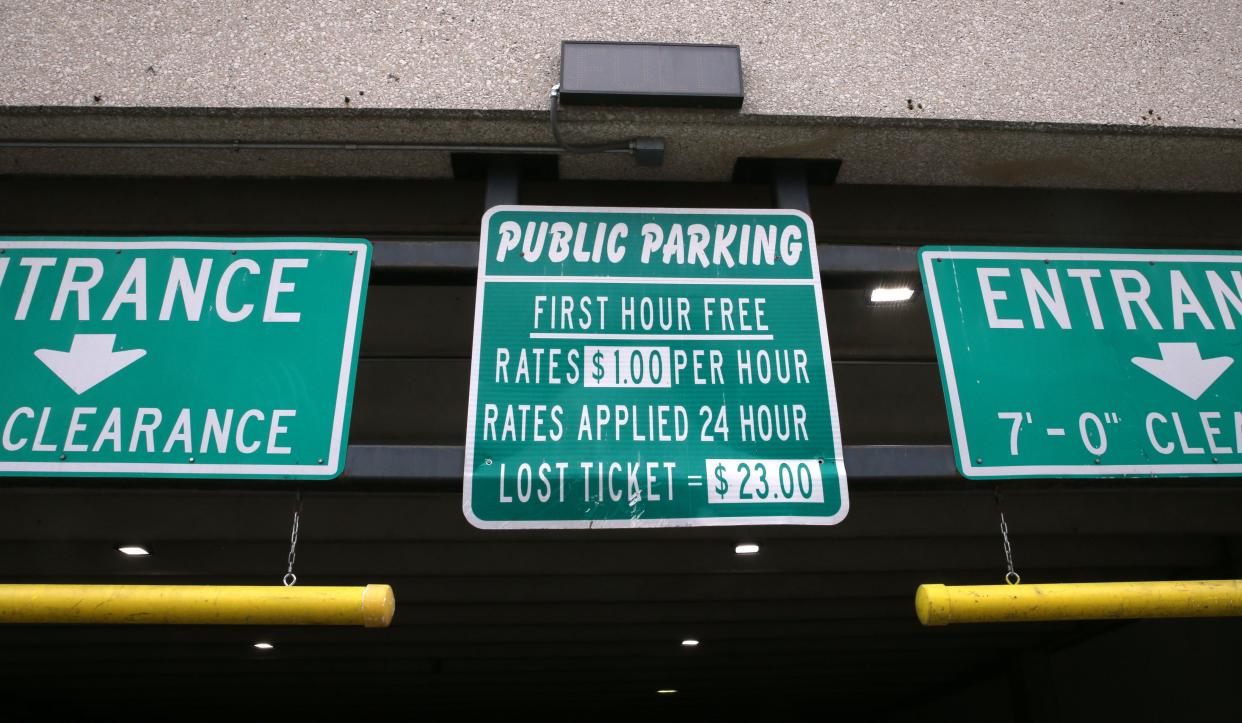Iowa City moves closer to using automated license plate cameras in parking ramps

Iowa City may soon use automated license plate readers in its parking ramps, in an effort to save time and curtail parking violations.
The already installed plate readers and "traffic engineering cameras" sparked a lengthy debate on Tuesday night as councilors battled with the language of an ordinance that guides the use of those devices.
The cameras are in place throughout the city but the license plate readers are not being used.
The Iowa City City Council passed the second of three considerations of an amendment to the local traffic ordinance on Tuesday by a narrow 4-3 vote. Councilors Andrew Dunn, Laura Bergus and Mazahir Salih voted "no," matching the vote during their July 16 meeting.
The "yes" votes do not necessarily mean the proposed language will go into effect if approved in two weeks.
The amendment would “allow transportation services to use automatic license plate recognition systems or devices for parking purposes.”
The amendment also says that the city can use license plate data for “a qualified law violation or other criminal violation” that warrants a ticket, citation, or arrest.
The council said it wanted the amendment to be more precise, specifically how and where the automated license plate readers could be used and whether police can use the data for other purposes.
Altered ordinance language is expected to go before the council at its next meeting.
More: Parking rates at ramps, meters will increase in Iowa City beginning July 1. What to know
What are the license plate readers going to be used for?
The Iowa City Parking Division asked the council to allow the use of automated license plate reader technology to help improve its enforcement process.
Staff members said the cameras would improve efficiency around the entrance and exit of the city's gated ramps. Associate Director of Transportation Mark Rummel estimated the technology will save the division an hour of manpower per ramp per day.
Rummel said the cameras will also discourage customers who park in a ramp for several days and then choose the 'lost ticket' option open at the exit gate. Likewise, the camera tech will help drivers who actually misplace their tickets.
Drivers with city parking permits would also no longer need a physical "hang tag" that is issued annually.
Plate reading technology already in place
The recently installed cameras are equipped with plate reading capabilities in three of the city's ramps. The two ungated ramps at Chauncey Swan and Harrison have the proper tech, as does the gated Capitol Street Ramp, though they haven't yet been activated.
The parking enforcement team also owns an automated license plate reader that is used on the street to detect long-term street parking.
"I don't think giving departments broad exceptions from this particular item is particularly wise," Dunn said.
Councilor Dunn asked for more precise language for where the plate readers can be used and by whom.
Dunn sent a rough draft of the language to staff, who said that excluding a department could unintentionally limit the investigative power of the police, noting that the proposed ordinance only allows the traffic and engineering department to use the data.
The council largely agreed that police should have access to the cameras for criminal investigations. Fruin and Goers said they believe police will not access such cameras without an "investigative purpose."
The final ordinance that will go into effect, including more precise language, is expected at the council's next meeting.
More: Celebrate Herbert Hoover's 150th birthday with Hoover's Hometown Days
City ordinance needs altered for plate reading cameras
City Manager Geoff Fruin said city code limits the camera's capabilities.
When the city considered using red light and speed cameras in 2013, the council codified protections that forbid the use of any kind of "automated traffic surveillance system or device."
The amendment states that "Neither Transportation Services Department license plate recognition systems or devices nor Streets and Traffic Engineering Division camera systems are included in this definition."
What else would change?
If the amendments are approved, the city's "traffic engineering" cameras—or "intersection cameras"—would also be code-exempt.
The city uses intersection cameras to investigate damaged or malfunctioning traffic signals.
The council had lengthy discussions about Flock cameras in recent months as it created its Fiscal 2025 budget. Flock is an automated license plate reader that some police departments, including the University of Iowa PD, have used.
The council did not set aside money in this year's budget, noting the same privacy concerns that were discussed Tuesday.
Fruin said at a previous council meeting that the proposed amendment won't allow for the use of Flock cameras,
"If we do want to revisit that discussion, we would have to revisit this ordinance," Fruin said.
Ryan Hansen covers local government and crime for the Press-Citizen. He can be reached at [email protected] or on X, formerly known as Twitter, @ryanhansen01.
This article originally appeared on Iowa City Press-Citizen: Iowa City considers using license plate cameras in parking ramps
